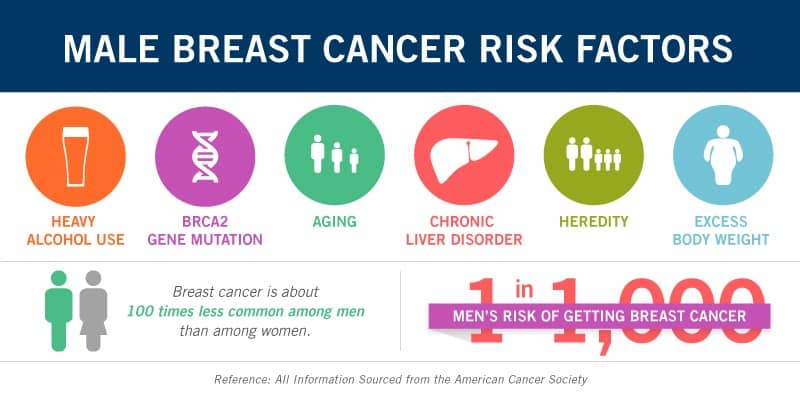The Breast Blog | Can Men Get Breast Cancer?
Mary Ling • November 7, 2020
Breast cancer in men is a rare disease, but it is often more advanced at diagnosis compared to breast cancer in women.
Why? Because many men do not realise that “breast cancer can happen to a bloke”. And men can also be notorious “doctor dodgers” who delay acting on symptoms, with a study showing the average time between first symptom and diagnosis in male breast cancer to be 19 months!
A recent study has also shown men are more likely than women to die from breast cancer, especially during the first 5 years of diagnosis.
Here are answers to 5 frequently asked questions about male breast cancer.
1. What are the causes?
The incidence of breast cancer in men increases with age. The average age of diagnosis is 69.
High oestrogen level
is another risk factor as breast growth is stimulated by oestrogen. Men can have high oestrogen levels as a result of taking hormonal medicines, being overweight, heavy alcohol use and liver disease.
Men who have been treated with radiotherapy
to the chest, usually for lymphoma, also have an increased risk of developing breast cancer.
Family history
can also increase the risk, especially if other men in the family have had breast cancer. The risk is also higher if there is a proven breast cancer gene abnormality in the family. However, the majority of male breast cancers still occur in men without a family history of breast cancer or an inherited gene abnormality.
2. What are the signs?
The most common sign is a painless lump in the breast close to the nipple. Men have less breast tissue, so a lump is often easier to detect.
Enlargement of both breasts, known as gynaecomastia, is usually not due to cancer.
3. How is it diagnosed?
The triple test is used to investigate breast changes in men. The triple test refers to 3 diagnostic components: medical history and clinical breast examination, imaging with mammogram and ultrasound, and then biopsy if abnormalities are identified.
4. What is the treatment for male breast cancer?
The main surgical treatment for breast cancer in men is mastectomy, which involves removal of the whole breast including the nipple. The lymph nodes in the armpit are usually sampled at the same time. Radiotherapy, chemotherapy, targeted therapy
and/or endocrine therapy
may also be required.
Men diagnosed with breast cancer should be referred for genetic counselling and testing. Male breast cancer is closely associated with BRCA1 and BRCA2 gene mutations. Identifying a gene mutation can influence screening for other cancers (e.g. prostate) and prompt testing of family members.
5. What is the prognosis?
Breast cancer in men can be treated successfully. The majority of men diagnosed and treated for early breast cancer will not die from the disease.





